- Home
- Joseph Bruchac
Sacajawea Page 15
Sacajawea Read online
Page 15
***
My own part of the plan went as smoothly as could be. It was as if I carried the good luck of our Corps of Discovery with me, having you and Janey, your mother, along. As always, York was there by my side, a ready hand whenever he was needed. Your mother knew the way, just as she'd said she did. Without a single misstep, we made our way across a pass through the mountains. We found the Yellowstone, fashioned canoes, and floated down her waters to the Missouri without much trouble at all.
We had gone near a thousand miles since I had last shaken Captain Lewis's hand. More than a month had passed, and it was now August. But there was no sign of Captain Lewis on the Missouri. We waited for some days, but game was scarce and mosquitoes plentiful. I left a note in a forked stick, as we had done before, and headed downriver to find better hunting.
Finally, at one o'clock on the afternoon of August 12, the canoe and the white pirogue heaved into view. My heart sank, though, when the first word given me by Drouillard was that Meri had been badly wounded.
"The Blackfeet?" I asked.
"No, a hunting accident. Nearsighted Cruzatte mistook his leathers for an elk. He is shot through the hip."
I found my dear friend lying facedown in the white pirogue. He was in great pain and could barely move. But he had kept the presence of mind to dress his wounds in the way best designed to speed their healing.
"Billy," he said, his voice as weak as a child's as he reached a hand to me. "It is so good to see you."
I must admit there were tears in my eyes at seeing my strong friend reduced to such a state. But wounded though his body might be, and disappointed though he might be in his hopes, his spirit was still unconquerable.
"Our friend Cruzatte always has been a finer fiddler than a hunter," he said. "I should thank Providence for that, or he would have hit me in the heart and not the rump." Then he laughed, though I could see that even laughter pained him.
***
Gradually, from Captain Lewis and the rest of his party, I learned how two parts of our great plan had faded. To begin with, Sergeant Pryor was there with them in the boats. He and the two men carrying the message to Heney had not gotten far before they lost all their horses to a raiding party of Indians. Making boats from the skins of buffalo, they had floated down the river to join Captain Lewis's men. So no offer of peace had been made to the Sioux. We could expect nothing in the way of friendship from them.
Captain Lewis and his nine men had also lost horses to Indian thieves. Of the seventeen mounts they began with, only seven remained by the time their party reached the Great Falls. There were not enough horses for Meri to take six men with him up the Marias, for spare horses were needed in order to be safe on such a mission. So he chose only three to go with him. They were Drouillard and the two Fields brothers, Joseph and Reubin. With the exception of John Colter, they were the finest of all the woodsmen in our Corps, and the best shots.
The deeper they went into Blackfeet lands, the more worried they became. So small a party and so few weapons would not discourage truly hostile Indians. When at last they did meet a group of eight or nine Indian men and youths, Meri thought them to be Minnetarees at first. In fact, they were Blackfeet. They were hesitant to approach and showed no warmth. Drouillard made the signs of friendship. Then Meri handed out a flag and some medals. It was finally agreed that they would camp together for the night. The Blackfeet built a domed lodge of willow branches and covered it with buffalo skins, inviting our men to join them in the shelter.
Leaving Reubin Fields on watch, Captain Lewis fell into a profound sleep, to be wakened at dawn by the sound of a man shouting.
"Damn you! Let go of my gun!"
It was Drouillard, struggling with one of the Blackfeet who had tried to steal his rifle as he slept. Meri reached for his own rifle. It was gone. Leaping up with his pistol in hand, he saw another of the Indians attempting to get away with his rifle.
Captain Lewis could have shot the man, but he did not. Instead he signaled for him to lay the gun down and back away. The Indian did as he said just as the two Fields brothers came running up, their own rifles at the ready.
By now Drouillard had won back his own gun.
"Let us shoot them, Captain," Drouillard said. He and the Fields brothers were both ready to kill whatever Indians they saw.
"No," Captain Lewis said. "We have our rifles. The Indians are falling back."
He still hoped even then, to avoid a fight. But then he saw the blood on Reubin Fields's shirt.
"What has happened?" Captain Lewis said.
A flood of words came forth from the two brothers. While Reubin slept and Joseph kept watch with his gun lying by his side, two Indians had crept up behind them, grabbing both their guns and running. But the Indians had not accounted for the swiftness of the two brothers, who chased after them and overtook them within sixty paces of the camp. In the struggle to get their guns back, Reubin had pulled his knife and thrust it into the heart of one of the Indians.
"He drew but one breath," Reubin said, "and the wind of his breath followed the knife, and he fell dead."
"The horses!" Captain Lewis said. And it was well he remembered, for the Indians were at that moment trying to steal their horses, leaving them unmounted in that hostile land.
"Shoot the Indians if they try to steal our horses!" Captain Lewis shouted. Then he ran after the men who were driving off the main bunch of the horses. One of the Indians took shelter behind a rock, but the other turned toward Meri and raised his gun, an old British flindock. Captain Lewis fired, hitting the man in his belly. Though it was a mortal blow, the young Blackfeet warrior still aimed his gun and fired. The ball passed so close to Merry's bare head that he felt the wind of the bullet.
There could be no further peace talks with the Blackfeet. Choosing three of their original horses and four of those left behind by the Blackfeet, Captain Lewis and Drouillard and the Fields brothers galloped south without pausing. But there was no pursuit. They reached the Missouri safely, to rejoin their party.
Did the Blackfeet ever do anything to get even, Pomp? I cannot truly say. Was it that fight that sowed the seeds other men would reap when they came into the lands of the fearsome Blackfeet? It may be so. All I do know is that but a year after our return to St. Louis, Joseph Fields vanished in the Rockies. He was killed, most said, by the Blackfeet. Our dear friend Drouillard returned to the Three Forks of the Missouri to help set up a fur post. And it was near there, a year past, that he lost his life, dying at the hands of the Blackfeet. There was no peace with that nation, and there still is none.
***
Just before we headed down the river again on that day of our reuniting, Meri admitted he was too weak to continue his journal.
"Billy," he said, "writing in my present situation is too painful. I must desist. I shall leave the continuation of our journey to you." Then he stared over my shoulder.
"What is it, Meri?" I said, fearing the wound had made him feverish and that he might be seeing things not there.
"Could you bring me," he said, "a branch from that unusual pin cherry just behind your shoulder?"
Then, as I held it before his face, despite his pain, he managed to write a good description of one last botanical specimen before we preserved it to take back with us.
33. SACAJAWEA
This Journey's End
Long ago, they say, the flowers of the prairie were not happy. Back then, whenever flowers died they lost their petals and fell to the earth and their beauty would be gone forever. When people died they walked the Sky Road up into the stars. The flowers felt that this was notfair and they said so to the Great Mystery. The Great Mystery agreed. When it came time for the flowers to die, the Great Mystery made a wind come. It blew thoseflowers' petals up into the sky. They became the colors of the rainbow.
So it is to this day. The rainbow reminds us that all beautiful things never really die.
IT WAS HAPPY and sad when our parties came back together
on the Great Muddy River that day. There was sun in our hearts to see friends we might never have seen again. But the bad wound Captain Lewis had suffered put a cloud over that sunshine. He was trying hard to recover, yet much of the time he was no stronger than you, Firstborn Son. He tried to stand and walk the next day, but his eyes rolled back into his head and he fell to the earth. Your good uncle had to watch out for him as if he were a baby, protecting him and keeping him from doing things that would hurt himself. York and I also spent much of our time by the side of Captain Lewis, helping to care for him. Whenever we pulled ashore, York and Captain Clark would have to lift him from the pirogue, and even though they were slow and gentle as they did this, he was in much pain. He continued to be weak for many days, even after their party left the Mandan villages.
It was sad, too, because our journey was almost over. You and your father and I might soon be parting from the captains. Unless some of the Minnetaree chiefs agreed to accompany the captains on down the river, there would be no need for us as interpreters. This upset your father, Charbonneau, very much. He could no longer imagine what life would be like unless we were in the company of these men who were so filled with curiosity and strength. They had shown courage and great patience on our journey. Even when your father did something foolish, which was often, they would always forgive him. But I did notice that as we came down the river they kept him at the other end of the white pirogue, far away from the rudder.
***
After the reunion on the river, only two sunrises passed before the big village of the Minnetarees came into view on the right bank of the river. Many people had come to the riverbank to see our arrival. The captains fired the big guns several times. Everyone was glad to see us. People had feared that we were all dead. Rumors had come down the river that we had frozen in the mountains, or that we had been wiped out by the Pahkees or taken prisoner by other white men who hated the Americans.
Black Moccasin, the chief of Meteharta, the Village of the Willows, where your father and I had been living before we met the captains, stood on the bank. He began weeping as our boats came to shore. But his tears were not those of gladness.
"I weep because my son is dead," Black Moccasin said. "He was killed by the Blackfeet."
Your father was sent to ask the various Minnetaree chiefs to gather for a meeting. Drouillard was sent downstream to the Mandan villages to bring back their chiefs and Jessaume the interpreter. Soon everyone was in the big council lodge. Even Captain Lewis was there, though he was not strong enough to speak. Your good uncle Captain Clark hoped to convince the chiefs to come with him to Washington. But things were not good. The ideas of peace put forward by the captains had not succeeded.
Black Moccasin spoke and told how things were. Soon after the captains had left, the Sioux had raided the Minnetarees and killed eight of them. The Arikaras had raided to steal many horses, and the Minnetarees had killed two Arikaras in turn. The Blackfeet continued to raid them from the north. It seemed as if everyone was at war.
"If the Sioux were at peace," Black Moccasin said, "and could be depended on, I would be glad to go and see the Great Father. But we are afraid of the Sioux and thus we will not go."
Though Captain Clark tried hard to convince them, none of the Minnetarees or the Mandans wanted to go down the river with them. It was clear that our jobs as interpeters were ended.
***
"Sacre," Charbonneau said, "to say adieu, my heart it will break."
Though I did not speak, I felt, too, as if a part of my heart was being taken from me. The white men had treated me with friendship and respect always, and I could not imagine ever meeting so fine a company of men again. You had become like a grandchild to Captain Clark. He had watched you grow now for two years. His eyes were always on you in those last days we were together. He would drop to one knee and hold out his hands. Then you would run to him on your strong little legs, as if you were dancing. You would grasp his leather jacket, begging him to lift you and throw you up into the air.
When I closed my eyes, I could no longer see the face of my own father clearly. So many winters had passed since that day at the Three Forks when the Minnetarees stole me from my family. But your good uncle had given me back what was left of my family. He had brought me back to my brother and the land of my birth and our people. I realized that I would always be able to remember the smiling face of Captain Clark. He had become a second father.
***
Only two days passed before it was time for them to leave. Captain Clark paid your father well for his services. He even offered to take us with them down to the Illinois if we wished. But your father turned down Captain Clark's kind offer.
"I would have no acquaintance there," Charbonneau said. "I would have no way to make a living. I must continue to live in the way I have done."
"Janey," Captain Clark said to me, "you deserve a greater reward for your attention and services than we have in our power to give you."
I said nothing in return. Our people have no words to say good-bye.
Then your good uncle held you in his arms one last time. "Pomp," he said, "my beautiful, promising, dancing boy."
Your hands on each side of his big face, your little fingers in his red hair, you looked up into his eyes. And Captain Clark's eyes were moist as he looked back at you.
"My dear friends," he said to us, "I want to ask you for a great favor. I want to take your son. Not now, but perhaps in a year, when he is weaned? I would raise him in such a manner as I think proper. He would want for nothing. Can you bring Pomp to me?"
Neither Charbonneau nor I hesitated. Though we both love you very much, we knew what a good life Captain Clark would give you. It was because we loved you that we wanted this for you. We agreed to bring you to him in the future. And then we parted.
34. WILLIAM CLARK
Old Friends No Longer with Us
Saturday 20th Septr. 1806
Every person, both French and americans seem to express great pleasure at our return, and acknowledged themselves much astonished in seeing us return. they informed us that we were supposed to have been lost long since, and were entirely given out by every person &c.
JOURNAL OF WILLIAM CLARK
ST. LOUIS
YES, POMP, OUR JOURNEY CONTINUED after your good mother's ended at the Mandan village. There we left you and your parents, with no little regret, though in hopes of a future reunion. Of our men, only John Colter stayed behind. We granted him an early discharge so that he might go back up the river with the two trappers we had met on our way down. Since then, Colter's own adventures—and wonderful stories—have added much to the map of the West that we drew.
As we continued down the river, Captain Lewis continued to improve in health.
Our one great fear was that the Sioux would attempt to stop our passage. So we swept past their main village on the river as fast as we could, keeping our boats well to the opposite bank and our weapons ready. Though they waved their arms at us and begged us to stop, we did not pause.
"You are bad people," Jessaume shouted at them.
At that, one of their great chiefs climbed to a hill and struck his war bow against the ground as he stared at us. This, we were told, was a great oath and showed his anger.
***
On we went, stopping briefly with the Arikaras but never slowing our progress more than a day or so. At last, on a day I shall never forget—September 20 it was—we knew that we were almost home. There, on the banks of the river, we saw cows grazing.
We were welcomed with joy and astonishment. All thought we had been lost. Some had said we were killed by the Indians. Others had heard that the Spanish had taken us prisoner and that we were captives, doomed to slave the rest of our lives in their mines. I would later discover, Pomp, that such might have been the case had we gone farther south. The Spanish knew of our journey and had sent parties of men out to capture us, though none ever came close.
Much had happened while we were
gone. We were as hungry for even the smallest bit of news as a starving man is for a crust of bread. The strangest thing was to hear that Aaron Burr, the vice president of the United States, had killed the secretary of the treasury, Alexander Hamilton, in a duel. The best news was that our great president, Thomas Jefferson, had been elected again to office. You see, Pomp, among our people a man is not chief forever. He serves for a time at the wish of the people and then retires to be just like other men. Yes, it must be hard for someone who has been a chief to return to being just like other men again.
We were feted and toasted by the whole town of St. Louis at a great dinner and ball held at Christy's Inn. Everyone made us welcome, and it seemed as if every home in this fair city was open to us. Then, in November, we were on our way again. President Jefferson had written Meri telling him of the "unspeakable joy" he felt at the news of his safe return. Captain Lewis was to hurry to Monticello and then to Washington. When he arrived there, our president welcomed Captain Lewis, who was like a son to him, with the greatest warmth. Meri had with him our journals and our maps. They spent long hours talking of the great discoveries and got down together on their hands and knees in the president's house to pore over the great map we had made of the West. In Washington Meri was treated as a great hero, which indeed he was.
As for myself, I went not to Washington but to Virginia. My mind had often been on my friends in Fincastle, and on one young Julia Hancock in particular. Yes, Pomp, you know her. She consented to be my wife.
During that time I was away from Meri, I fear that things began to go awry. With so much celebration and not enough work to fill the day, Meri took to drinking too heavly. After each bout of drinking he felt great shame and vowed to stop, but he always broke his vow.
Then Jefferson gave him the honor of the governorship of Louisiana, and Meri returned to St. Louis in 1808. I had been placed in charge of Indian affairs for the territory. I planned to arrive from Virginia some time after Meri, who had been expected in Louisiana a frill year before he finally got there. He had lingered longer than expected, first in Washington and then in Philadelphia and then in Virginia. He had courted first one young woman and then another. He longed to be married as I was, but each romance ended in failure. We all, even President Jefferson, were greatly concerned about him.

 Peacemaker
Peacemaker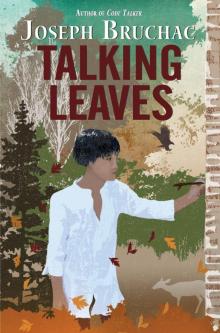 Talking Leaves
Talking Leaves Found
Found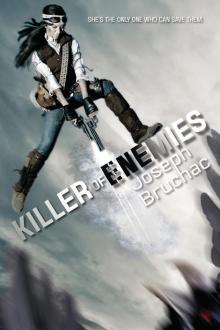 Killer of Enemies
Killer of Enemies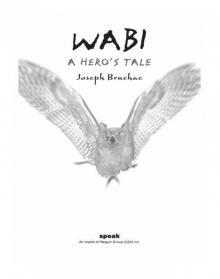 Wabi
Wabi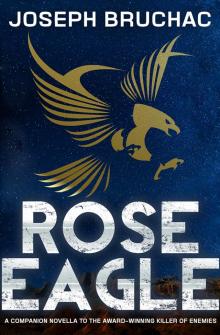 Rose Eagle
Rose Eagle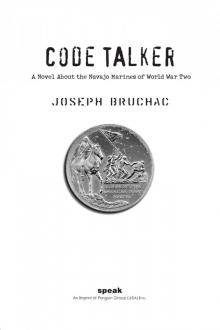 Code Talker
Code Talker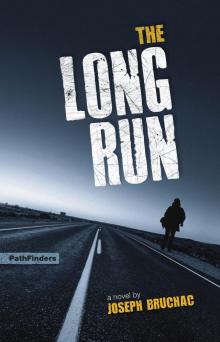 The Long Run
The Long Run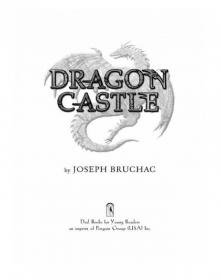 Dragon Castle
Dragon Castle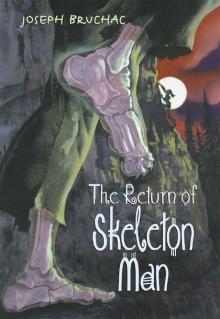 The Return of Skeleton Man
The Return of Skeleton Man Pocahontas
Pocahontas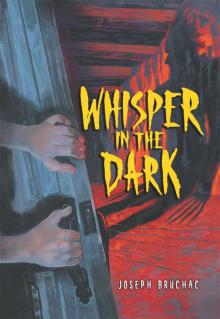 Whisper in the Dark
Whisper in the Dark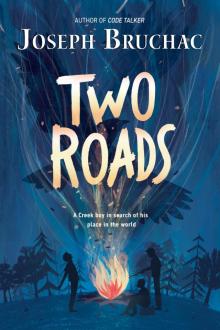 Two Roads
Two Roads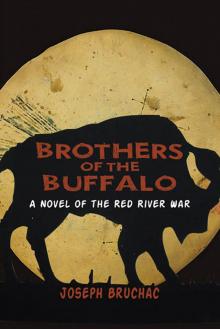 Brothers of the Buffalo
Brothers of the Buffalo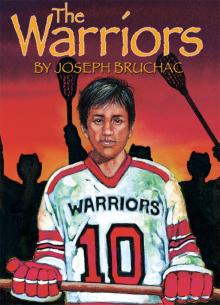 The Warriors
The Warriors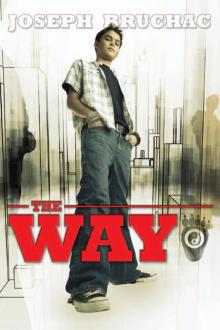 The Way
The Way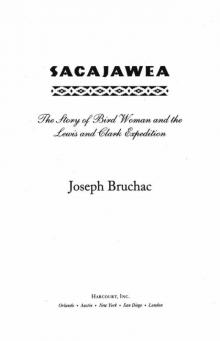 Sacajawea
Sacajawea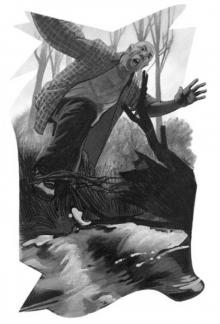 Night Wings
Night Wings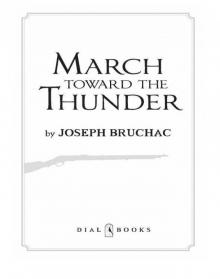 March Toward the Thunder
March Toward the Thunder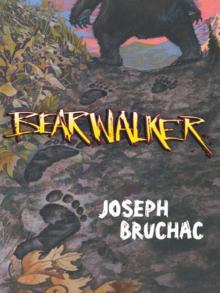 Bearwalker
Bearwalker Skeleton Man
Skeleton Man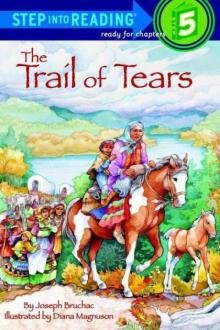 The Trail of Tears
The Trail of Tears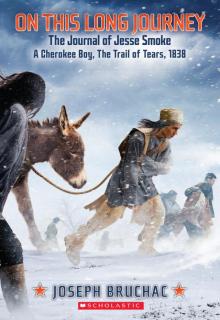 On This Long Journey
On This Long Journey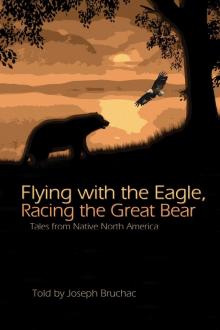 Flying with the Eagle, Racing the Great Bear
Flying with the Eagle, Racing the Great Bear